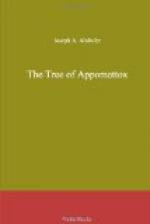Mortimer smiled, waved them farewell, and, a few minutes later, was at work once more with the flags. Meanwhile, Harry and St. Clair were descending the mountain, pausing now and then to survey the valley with their glasses, where they could yet mark the movements of the Northern troops. When they reached the cove they found that the board and the chess men were put away, and the two colonels were inspecting the Invincibles to see that the last detail was done, while Early made ready for his desperate venture.
Harry and his comrades were fully conscious that it was a forlorn hope. They had been driven out of the valley once by superior numbers and equipment, directed by a leader of great skill and energy, but now they had come back to risk everything in a daring venture. The Union forces, of course, knew of their presence in the old lines about Fisher’s Hill— Shepard alone was sufficient to warn them of it—but they could scarcely expect an attack by a foe of small numbers, already defeated several times.
Harry’s thought of Shepard set him to surmising. The spy no longer presented himself to his mind as a foe to be hated. Rather, he was an official enemy whom he liked. He even remembered with a smile their long duel when Lee was retreating from Gettysburg, and particularly their adventure in the river. Would that duel between them be renewed? Intuition told him that Shepard was in the valley, and if Sheridan was worth ten thousand men the spy was worth at least a thousand.
The Invincibles were ready to the last man, and it did not require any great counting to reach the last. Yet the two colonels, as they rode before their scanty numbers, held themselves as proudly as ever, and the hearts of their young officers, in spite of all the odds, began to beat high with hope. The advance was to be made after dark, and their pulses were leaping as the twilight came, and then the night.
The march of the Southern army to deal its lightning stroke was prepared well, and, fortunately for it, a heavy fog came up late in the night from the rivers and creeks of the valley to cover its movements and hide the advancing columns from its foe. When Harry felt the damp touch of the vapor on his face his hopes rose yet higher. He knew that weather, fog, rain, snow and flooding rivers played a great part in the fortunes of war. Might not the kindly fog, encircling them with its protection, be a good omen?
“Chance favors us,” he said to St. Clair and Langdon, as the fog grew thicker and thicker, almost veiling their faces from one another.
“I told you that the optimists usually had their way,” said Happy. “We persisted and found that orchard of apples. We persisted and found that fat porker. Now, I have been wishing for this fog, and I kept on wishing for it until it came.”
Harry laughed.
“You do make the best of things, Happy,” he said.




